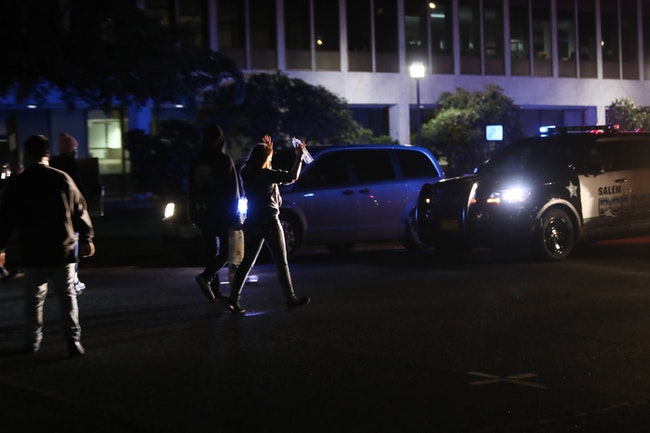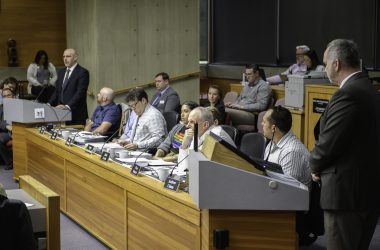A pending federal court ruling could nullify the most costly civil verdict against the city of Salem in recent history, after a jury previously found a city police officer used excessive force against a woman by shooting her with rubber bullets.
The Department of Public Safety Standards and Training, the state agency tasked with licensing officers and investigating complaints of misconduct, opened its investigation of officer Robert Johnston on Nov. 3, about a month after the verdict.
But that investigation is on hold pending a judge’s ruling over whether Johnston violated legal or constitutional rights clearly established under the law, an issue raised by the city before trial and again afterward.
Ahead of the trial, attorneys representing the city had argued Johnston was entitled to qualified immunity. That legal principle is intended to shield government workers from liability in cases where they are accused of violating a person’s rights, but did not violate a clearly established legal or constitutional right. U.S. District Judge Michael McShane wrote in a March 21 opinion that because the issue relied on disputed facts, the court couldn’t yet rule on qualified immunity.
If a judge finds Johnston is entitled to qualified immunity, they would nullify the jury’s verdict and decide the suit in favor of the city and the officer.
When a judge will rule on the matter is unclear. No future hearings were scheduled in the case as of Tuesday afternoon, court records showed.
Johnston retired from the Salem Police Department in late June after nearly 18 years. He also worked as a part time academy instructor at DPSST for three years and resigned on Nov. 4, one day after the state agency opened its investigation, according to DPSST records.
The investigation stemmed from a lawsuit that Eleaqia McCrae, 22, filed against the city and Johnston over conduct at a May 2020 protest after Minneapolis police officer Derek Chauvin murdered George Floyd. McCrae alleged in her lawsuit that Salem police intentionally targeted Black protesters during a peaceful march and corralled demonstrators without providing them a way to leave, using tear gas and rubber bullets to disperse protests they said turned violent.
McCrae’s lawsuit described the march as having no rioting, looting or destruction of property. “After nightfall, people unrelated to the peaceful march came in from side streets, and from behind the march throwing objects into the crowd,” according to her complaint.
Her complaint said she suffered permanent eye damage after Johnston shot her twice with rubber bullets, hitting her in the eye and chest.
A jury in September unanimously found Johnston violated McCrae’s Fourth Amendment right to not be subjected to excessive force in the U.S. District Court in Eugene. The jury determined Johnston didn’t intentionally target McCrae, commit battery or violate her First Amendment rights.
The jury awarded McCrae $250,000 for economic loss and $800,000 in non-economic damages. Courtney Knox Busch, Salem’s strategic initiatives manager, told Salem Reporter following the verdict that she was not aware of another civil case in the past decade where a jury awarded $1 million or more in damages to a plaintiff suing the city.
An attorney for Johnston again raised the issue of qualified immunity on Oct. 14 following the verdict, seeking a ruling in favor of Johnston and arguing no law clearly established that an officer violates a person’s Fourth Amendment rights by firing rubber bullets under the circumstances Johnston was facing. His attorney wrote in a court filing that the crowd was composed of aggressive protesters who threatened officers.
The parties are currently awaiting court ruling on whether Johnston is entitled to qualified immunity, according to attorneys representing McCrae and Johnston. Until then, the state’s investigation of the officer will remain paused.
Both attorneys declined to comment.
“DPSST does have (an) open Professional Standards review that is currently on hold until the civil matter is concluded,” according to Rebecca Hannon, a records specialist for the agency. “Once the civil matter is concluded, DPSST will determine if we need to move forward on the Professional Standards review.”
Knox Busch said the city did not know when the matter would be concluded. She noted Johnston was no longer employed by the city.
According to her complaint, McCrae, a West Salem High School graduate and student-athlete at Mt. Hood Community College, attended the Salem protest with her sister and a friend, marching with demonstrators to the Center Street Bridge and back to the Capitol around 9 p.m.
Her lawsuit said Salem police outfitted in full SWAT gear with a military vehicle blocked the crowd from marching. Police ordered the crowd to disburse, but protesters near the front of the march couldn’t because they were blocked by police in front and other marchers behind them, according to the suit.
“When the march was stopped by SPD there was no rioting, looting, or destruction of public and private property. There was no violence prior to the SPD show of force. It was a peaceful assembly. The marchers, including Elea McCrae, linked arms, and silently knelt in the street. The marchers and Elea McCrae then stood up. The police then began blaring their sirens,” the lawsuit said.
When McCrae got up and began to turn around to leave, Johnston shot her twice, and she passed out after being shot in the eye and unable to see out of her other eye, according to the complaint.
In the city’s response to the lawsuit, attorneys representing Salem said McCrae’s injuries, “if any,” were caused by “by failing to disperse the area when the protests were no longer peaceful.”
The city argued that tactics police used were justified in response to demonstrators throwing objects at officers, and denied that the march was peaceful when police stopped it.
Police arrested more than a dozen people in Salem during protests and marches in summer 2020 following Floyd’s murder. When early demonstrations saw vandalism and rioting, the city enacted a curfew to prevent more disturbances.
Most of the people arrested initially faced charges of riot, disorderly conduct, trespassing or interfering with officers. Several who spoke to Salem Reporter after their arrests said police had cornered them while they were trying to leave.
In late June 2020, the Marion County District Attorney’s Office dismissed criminal charges against 14 people arrested during protests the previous month. Deputy District Attorney Amy Queen said at the time that attorneys determined they didn’t meet the threshold for the office to continue prosecution.
Contact reporter Ardeshir Tabrizian: [email protected] or 503-929-3053.
JUST THE FACTS, FOR SALEM – We report on your community with care and depth, fairness and accuracy. Get local news that matters to you. Subscribe to Salem Reporter. Click I want to subscribe!

Ardeshir Tabrizian has covered criminal justice and housing for Salem Reporter since September 2021. As an Oregon native, his award-winning watchdog journalism has traversed the state. He has done reporting for The Oregonian, Eugene Weekly and Malheur Enterprise.









